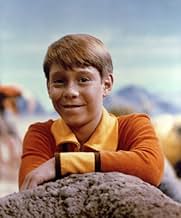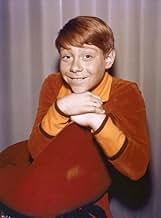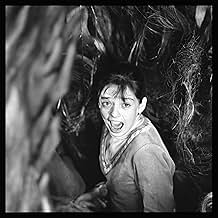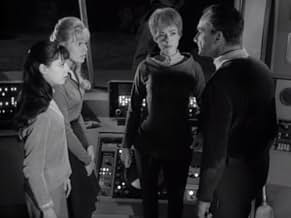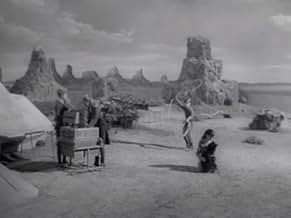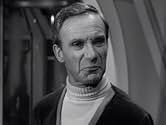Una familia en una colonia espacial intenta sobrevivir cuando un polizón accidental saca a su nave del rumbo establecido.Una familia en una colonia espacial intenta sobrevivir cuando un polizón accidental saca a su nave del rumbo establecido.Una familia en una colonia espacial intenta sobrevivir cuando un polizón accidental saca a su nave del rumbo establecido.
- Nominado para 2 premios Primetime Emmy
- 1 premio y 5 nominaciones en total
Explorar episodios
Reseñas destacadas
The 1960s was a great decade for television, or so to me. 'The Addams Family', 'The Munsters', Doctor Who', 'My Favourite Martian', 'Batman', 'Star Trek', 'Bewitched', 'I Dream of Jeannie', 'Dark Shadows', 'I Love Lucy', 'McHale's Navy', 'Green Acres', 'The Avengers', and they are just a few examples of very good to classic shows from that decade.
'Lost in Space' may be an uneven show, no this is not one of those rarities where there was not a dud episode throughout. Then again some of the aforementioned shows had rocky moments and inconsistency in their runs too, but it deserves to be mentioned in the same breath as the above. When it was good, it was very good and even more than that on many occasions. However, when it was not so good, it was pretty bad to embarrassing. Overall though, it was a very good and influential show that did a lot with a unique concept.
Its best and most consistent season was the first. It had a darker and more sombre tone than the campier nature of the succeeding two seasons, with a real maturity, some suspense and sense of mystery and wonder. Yet it also didn't forget to be fun and full of adventure while treating its stories with intelligence and wit and its audience with respect. The monsters were mostly impressive in design and there were some memorable ones, likewise with the staging of the encounters with them, which were suspenseful and sometimes funny. There was a much better balance of characterisation, and the cast enjoy themselves without going over the top.
However, 'Lost in Space' was at its weakest in the second half of Season 3, where it felt like a different show. While it was understandable for the tone to be lightened to gain more viewers, it did cause a wide divide quality-wise and like the lightning up was taken too far. Not completely unwatchable, with "The Anti-Matter Man" being among the show's better episodes. It was during this period where farce replaced endearingly campy silliness (say what you want about Season 2 being silly, and it was admittedly, but it was still at least entertaining and endearing), repetition and near-incoherence was all over, camp was taken to extremes and the characterisation lacked balance and got over the top in some instances with far too much emphasis on Dr Smith and the robot. Most of the show's worst episodes were in this period too, with "The Great Vegetable Rebellion" gaining infamy as a hilariously terrible episode for good reason.
Visually, 'Lost in Space' looked good on the whole. Preferred it in black and white myself, being a little more atmospheric, but the colour has a 60s charm that holds up well. The sets are very imaginatively used and there are impressive special effects (as well as the odd hokey ones) for the monsters. The music is rousing and haunting with one of the most memorable main themes for a TV show that decade.
Regarding the writing, a lot of it was funny, clever with its fair share of suspense and emotion before getting too silly in Season 3. Some of the catchphrases or memorable quotes are iconic, Dr Smith has the best lines often (especially the repeated ones). The stories were mostly highly engaging and made the most of a unique concept at the time, space has often been portrayed as being wondrous and mysterious and 'Lost in Space' conveys that very well. There are some interesting themes that it covers too, both in its ideas and topics that are of relevance now.
Characters are not easy to forget, especially Dr Smith (regardless of whether he is used too much or a caricature later on, he is a fascinating character and has some of the best lines, he is a character we should hate but there is just something so lovable about him) and the robot and it is hard not to love the dynamic between them, or be endeared by Will. The cast do seem to be enjoying themselves thoroughly and that they know which tone they're going for.
Jonathan Harris' Dr Smith is an unforgettable creation and a genre character landmark, anybody asked about what role they associate Harris with would most likely choose his role here. Very like they would with the roles of Adam West in 'Batman', Ray Walston in 'My Favourite Martian', Jonathan Frid in 'Dark Shadows' and Elizabeth Montgomery in 'Bewitched'. Equalling him, let alone topping him, is impossible, and even if achieved is a monumental task as proved (and nowhere near as successfully) in the film version three decades later. Guy Williams, Bill Mumy and June Lockhart are all very good as well and the robot and its dynamic with Dr Smith is one of the show's greatest pleasures.
Overall, an uneven show but a very entertaining one and a very good one at its best. 8/10 Bethany Cox
'Lost in Space' may be an uneven show, no this is not one of those rarities where there was not a dud episode throughout. Then again some of the aforementioned shows had rocky moments and inconsistency in their runs too, but it deserves to be mentioned in the same breath as the above. When it was good, it was very good and even more than that on many occasions. However, when it was not so good, it was pretty bad to embarrassing. Overall though, it was a very good and influential show that did a lot with a unique concept.
Its best and most consistent season was the first. It had a darker and more sombre tone than the campier nature of the succeeding two seasons, with a real maturity, some suspense and sense of mystery and wonder. Yet it also didn't forget to be fun and full of adventure while treating its stories with intelligence and wit and its audience with respect. The monsters were mostly impressive in design and there were some memorable ones, likewise with the staging of the encounters with them, which were suspenseful and sometimes funny. There was a much better balance of characterisation, and the cast enjoy themselves without going over the top.
However, 'Lost in Space' was at its weakest in the second half of Season 3, where it felt like a different show. While it was understandable for the tone to be lightened to gain more viewers, it did cause a wide divide quality-wise and like the lightning up was taken too far. Not completely unwatchable, with "The Anti-Matter Man" being among the show's better episodes. It was during this period where farce replaced endearingly campy silliness (say what you want about Season 2 being silly, and it was admittedly, but it was still at least entertaining and endearing), repetition and near-incoherence was all over, camp was taken to extremes and the characterisation lacked balance and got over the top in some instances with far too much emphasis on Dr Smith and the robot. Most of the show's worst episodes were in this period too, with "The Great Vegetable Rebellion" gaining infamy as a hilariously terrible episode for good reason.
Visually, 'Lost in Space' looked good on the whole. Preferred it in black and white myself, being a little more atmospheric, but the colour has a 60s charm that holds up well. The sets are very imaginatively used and there are impressive special effects (as well as the odd hokey ones) for the monsters. The music is rousing and haunting with one of the most memorable main themes for a TV show that decade.
Regarding the writing, a lot of it was funny, clever with its fair share of suspense and emotion before getting too silly in Season 3. Some of the catchphrases or memorable quotes are iconic, Dr Smith has the best lines often (especially the repeated ones). The stories were mostly highly engaging and made the most of a unique concept at the time, space has often been portrayed as being wondrous and mysterious and 'Lost in Space' conveys that very well. There are some interesting themes that it covers too, both in its ideas and topics that are of relevance now.
Characters are not easy to forget, especially Dr Smith (regardless of whether he is used too much or a caricature later on, he is a fascinating character and has some of the best lines, he is a character we should hate but there is just something so lovable about him) and the robot and it is hard not to love the dynamic between them, or be endeared by Will. The cast do seem to be enjoying themselves thoroughly and that they know which tone they're going for.
Jonathan Harris' Dr Smith is an unforgettable creation and a genre character landmark, anybody asked about what role they associate Harris with would most likely choose his role here. Very like they would with the roles of Adam West in 'Batman', Ray Walston in 'My Favourite Martian', Jonathan Frid in 'Dark Shadows' and Elizabeth Montgomery in 'Bewitched'. Equalling him, let alone topping him, is impossible, and even if achieved is a monumental task as proved (and nowhere near as successfully) in the film version three decades later. Guy Williams, Bill Mumy and June Lockhart are all very good as well and the robot and its dynamic with Dr Smith is one of the show's greatest pleasures.
Overall, an uneven show but a very entertaining one and a very good one at its best. 8/10 Bethany Cox
I don't know if combining Forbidden Planet with Seinfeld and Gilligan's Island is exactly on target, but there are elements of all three. I was in second grade when this show premiered, and I never missed an episode. The stories were always interesting to me, and even at age eight the character of Dr. Smith absolutely captured my imagination. There are aspects of this fellow that are so very interesting - here is a guy with a great deal of education who never seems to have learned anything from the mythology he is always reciting to everyone, as in "All That Glitters", my all-time favorite episode. He didn't remember the tragedy of King Midas when he was making his wish? His greed and his cowardice override any mental advantage he may have. He is truly the George Costanza of space exploration - whenever he stumbles upon a piece of good fortune he has to milk it for all it's worth until the whole situation turns on him. Then there are the children - Will and Penny. No matter what Dr. Smith does they still like the guy, and he does a lot. He bargains with aliens to take Will's brain for their experiments instead of his, and in another episode turns Penny into platinum, although he does feel remorse about the latter deed. In fact, the children are Smith's only friends. He is merely tolerated by the adults, and for good reason.
Finally there is the "innocence and chastity beyond reason" element that was part of Gilligan's Island and is part of this show too. Despite the only natural and healthy attraction between Major Donald West and Judy Robinson, we are to believe that nothing really happens between the two for years on end. Also like Gilligan's Island, although the group's first priority starts off as finding a way to return to earth, eventually they settle into a kind of domestic tranquility and seem to make peace with their situation of being "lost in space".
Of course, rewatching this series over forty years later, it is not quite as great as I remembered it, but it is still great fun and Smith is still a fascinating character. It's also interesting to see what people in the 1960's thought earthly civilization would be like in 1997. It's humorous yet somewhat tragic to see the optimistic viewpoint people had of the future in the 1960's pertaining to human nature. What the series' creators couldn't foresee is that today people are much more like Zachary Smith than the Robinson family - at least the people in charge of things are.
Finally there is the "innocence and chastity beyond reason" element that was part of Gilligan's Island and is part of this show too. Despite the only natural and healthy attraction between Major Donald West and Judy Robinson, we are to believe that nothing really happens between the two for years on end. Also like Gilligan's Island, although the group's first priority starts off as finding a way to return to earth, eventually they settle into a kind of domestic tranquility and seem to make peace with their situation of being "lost in space".
Of course, rewatching this series over forty years later, it is not quite as great as I remembered it, but it is still great fun and Smith is still a fascinating character. It's also interesting to see what people in the 1960's thought earthly civilization would be like in 1997. It's humorous yet somewhat tragic to see the optimistic viewpoint people had of the future in the 1960's pertaining to human nature. What the series' creators couldn't foresee is that today people are much more like Zachary Smith than the Robinson family - at least the people in charge of things are.
There are a lot of people who gripe about how the show set out to be dead serious and later became corrupted by the "camp craze" that started with the Batman show. But I like this series from beginning to end, with my only regret being that the show didn't get properly wrapped up at the end.
I like this show because you could see the love Will Robison felt for his father and unlike the dysfunctional television families of today, John Robison had great love for his son; and the bond between John and Maureen was also unshakable. This was a warm and caring family, and I liked that more then some of the silly plots.
That's not to say that I didn't like the plots: often they were silly and made me laugh-- probably when they were trying to be serious, and made more so by the limited budgets and special effects of the '60s. But if you made the same show today, using the most expensive CGI effects, the new show would not have the same warmth and charm, and it would die within a season. It's so sad that writers today don't know anything about what a family should be. Look at the recent movie; see how the producer's '90s view had a troubled Will Robinson, and a self-centered Penny, along with a soulless John Robinson who had all the charm of a brick.
I am glad that Lost In Space is on DVD as well as video and that people can see a great classic television show. So what, there were giant talking carrots! It was one of several funny episodes that I wouldn't miss it for anything in the world. There were some that stank, too, and I wouldn't miss those either. It was overall, a great series. And without Lost In Space, there would not have been a Star Trek. People forget that, too.
I give my respects to the late, great, Jonathan Harris. Doctor Smith, I'll miss you...
I like this show because you could see the love Will Robison felt for his father and unlike the dysfunctional television families of today, John Robison had great love for his son; and the bond between John and Maureen was also unshakable. This was a warm and caring family, and I liked that more then some of the silly plots.
That's not to say that I didn't like the plots: often they were silly and made me laugh-- probably when they were trying to be serious, and made more so by the limited budgets and special effects of the '60s. But if you made the same show today, using the most expensive CGI effects, the new show would not have the same warmth and charm, and it would die within a season. It's so sad that writers today don't know anything about what a family should be. Look at the recent movie; see how the producer's '90s view had a troubled Will Robinson, and a self-centered Penny, along with a soulless John Robinson who had all the charm of a brick.
I am glad that Lost In Space is on DVD as well as video and that people can see a great classic television show. So what, there were giant talking carrots! It was one of several funny episodes that I wouldn't miss it for anything in the world. There were some that stank, too, and I wouldn't miss those either. It was overall, a great series. And without Lost In Space, there would not have been a Star Trek. People forget that, too.
I give my respects to the late, great, Jonathan Harris. Doctor Smith, I'll miss you...
I guess I'm alone in my views these days, but I've never agreed with the critics (or the vast audiences) that adore contemporary TV series like "Seinfeld" or "Friends."
For me, the best decade for TV (by a million miles) was the 1960s. It was truly a unique decade for television. Series produced then are totally unlike anything produced previously or since. I don't know what it was (perhaps someone spiked the water back then), but TV in the 1960s was unique. There was a certain sense of wonder, a certain sense of the fantastic---and a definite 60s vibe of surrealism that crept into every show from "Green Acres" to "Batman" to "Gilligan's Island."
And for my money, the best show in TV's greatest decade was "Lost in Space." It's impossible to describe what watching this show was like in the 1960s. It's an experience that simply can't be re-produced today. For a start, America was still an optimistic nation and we had an ambitious space program that would soon take us to the moon. For everyone who was young in the 60s, it seemed highly plausible that, we too, would get a chance to ride a rocket into space within our lifetimes. Little could we fathom that, after 1972, America wouldn't even land a person on the moon for 35 long years.
Today's TV shows are stiflingly dull and seem to be created by committees that cynically use focus groups to create their sterile product. "Lost in Space" is a million miles away from this creative process. In fact, it's the total opposite (and all the more brilliant for this).
The greatest science fiction always had a sense of wonder and mystery. "Lost in Space" captured the mystery of space---indeed, the show itself was actually quite bizarre. It's a far cry from the over-rated "Star Trek," which, instead of giving us a sense of mystery, followed an (increasingly stale) by-the-numbers formula.
And "formula" is precisely what one did NOT get in viewing "Lost in Space." Indeed, this show is so strange that, viewing it today, it seems like a relic from a lost civilization. It's hard, in fact, to really even fathom who the producers were targeting as their audience.
Naturally, there are cynics who hate this show, and fall over themselves pointing out the plot holes and the ignorance of "realism." To those folks, I say: Chill out. Even TV's "realistic" shows are NOT as realistic as they hyped to be. "Star Trek," for example, has plenty of flaws in its science. Even a highly-praised show like "ER," the medical drama, has plenty of inaccuracies (as any medical professional will tell you).
In many ways, "Lost in Space" does a wonderful job of capturing the essence of what made the 60s the greatest decade of the 20th century for TV, film, music, and culture in general. It's something we'll never re-capture in today's stale culture, dominated as it is by dull, overpaid celebrities. We've gone a long ways downhill from The Beatles to "American Idol."
For me, the best decade for TV (by a million miles) was the 1960s. It was truly a unique decade for television. Series produced then are totally unlike anything produced previously or since. I don't know what it was (perhaps someone spiked the water back then), but TV in the 1960s was unique. There was a certain sense of wonder, a certain sense of the fantastic---and a definite 60s vibe of surrealism that crept into every show from "Green Acres" to "Batman" to "Gilligan's Island."
And for my money, the best show in TV's greatest decade was "Lost in Space." It's impossible to describe what watching this show was like in the 1960s. It's an experience that simply can't be re-produced today. For a start, America was still an optimistic nation and we had an ambitious space program that would soon take us to the moon. For everyone who was young in the 60s, it seemed highly plausible that, we too, would get a chance to ride a rocket into space within our lifetimes. Little could we fathom that, after 1972, America wouldn't even land a person on the moon for 35 long years.
Today's TV shows are stiflingly dull and seem to be created by committees that cynically use focus groups to create their sterile product. "Lost in Space" is a million miles away from this creative process. In fact, it's the total opposite (and all the more brilliant for this).
The greatest science fiction always had a sense of wonder and mystery. "Lost in Space" captured the mystery of space---indeed, the show itself was actually quite bizarre. It's a far cry from the over-rated "Star Trek," which, instead of giving us a sense of mystery, followed an (increasingly stale) by-the-numbers formula.
And "formula" is precisely what one did NOT get in viewing "Lost in Space." Indeed, this show is so strange that, viewing it today, it seems like a relic from a lost civilization. It's hard, in fact, to really even fathom who the producers were targeting as their audience.
Naturally, there are cynics who hate this show, and fall over themselves pointing out the plot holes and the ignorance of "realism." To those folks, I say: Chill out. Even TV's "realistic" shows are NOT as realistic as they hyped to be. "Star Trek," for example, has plenty of flaws in its science. Even a highly-praised show like "ER," the medical drama, has plenty of inaccuracies (as any medical professional will tell you).
In many ways, "Lost in Space" does a wonderful job of capturing the essence of what made the 60s the greatest decade of the 20th century for TV, film, music, and culture in general. It's something we'll never re-capture in today's stale culture, dominated as it is by dull, overpaid celebrities. We've gone a long ways downhill from The Beatles to "American Idol."
I think this was the best thing that Irwin Allen ever did. Although the show drifted far away from its original synopsis,the adventures of a family in space, it eventually became the story of a boy and his robot. Bill Mumy became a hot talent in Hollywood after the series and his role as Will as the likeable son is one of TV's most endearing roles. Johnathan Harris was the villain we loved to hate as he became of another of the screen's most versatile character actors. The man showed great talent arguing with an inanimate prop and making it the hero of the show. The unnamed robot, ironically, became more dimensionally than anyone else in the show, and forget Mary Anne vs. Ginger, how many guys had crushes on Penny Robinson than on Judy ? Penny was the adorable ingenue next to the obvious Hollywood presence of Marta Kristen, the first Marilyn Monroe of the galaxy. John and June Robinson, however, slowly became less the leaders and heros of the series as they became closer to Ward and June Cleaver as they spilled out parental advice and punishments. Don West, however, remained mostly the same character without any developments in his character and past, but that can be directly blamed on the series focus between Will, the Robot and Dr. Smith while everyone else became just a little bit more than supporting roles. Despite these few faults, I still think its one of the best things to ever grace television.
¿Sabías que...?
- CuriosidadesJune Lockhart had the biggest parking space on the 20th Century-Fox lot because she would often drive her favorite vehicle to work - a 1923 fire engine.
- PifiasThe Robot is mounted on tracks. Yet in close-ups when it moves with a normal walking action and it is possible to see the actors legs move in the lower parts of the suit.
- Versiones alternativasA pilot episode was filmed that did not include either Robot or Dr. Smith! This film was not broadcast in 1965 but was shown on TV and released to video in the 1990s.
- ConexionesEdited into The Man from the 25th Century (1968)
Selecciones populares
Inicia sesión para calificar y añadir a tu lista para recibir recomendaciones personalizadas
Detalles
- Duración1 hora
- Color
Contribuir a esta página
Sugerir un cambio o añadir el contenido que falta





